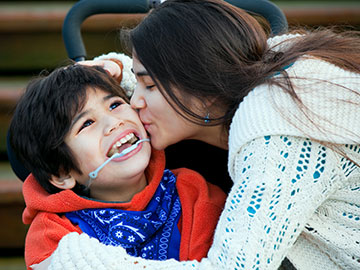Do perceptions matter?
Page 3: Cultural-Based Perceptions
 Among the major factors shaping our beliefs and attitudes about disabilities are our own cultural backgrounds and experiences. And just as our culture influences the way we think about technology, food, religion, and family, so also can it inform how we regard disabilities. For example, depending on your cultural background, you might perceive a disability to be:
Among the major factors shaping our beliefs and attitudes about disabilities are our own cultural backgrounds and experiences. And just as our culture influences the way we think about technology, food, religion, and family, so also can it inform how we regard disabilities. For example, depending on your cultural background, you might perceive a disability to be:
- A blessing. The person with the disability possesses unique gifts that contribute to the family or community.
- Something to be addressed through medical or educational interventions. A disability is a potential barrier than can be mitigated or overcome through various means.
- A curse. The disability is a punishment on the family for any number of violations or transgressions.
The strength of a family’s cultural beliefs affect how they treat a family member with a disability. Some people with disabilities face little bias or discrimination, while others may be shunned or excluded.
![]()
In her poem “Ursa Minor,” Jody Barnes writes about her perceptions of her son Alex. As you read it, consider whether Jody, who is Native American, has a similar or different perception of disability than the teachers and doctors who work with her son. When you are ready, complete the activity below (time: 2:31).
Ursa Minor
They want to trap you in the flatness of their paper charts
They lay snares of straight lines and sharp corners
Because you are different
they name you with short, sharp words
autistic, A.D.D., hyper
They say something’s wrong
He won’t speak when spoken to,
He won’t count to five or say his ABCs
or play with other kids his age
With pens poised above graphs they wait
‘What color is the umbrella, Alex?’
You look through them
past the picture of the yellow umbrella
past the calm beige walls
through time and space
Tattooed behind your cautious eyes is the path
through the Milky Way
In the dark of your room when I lean down to kiss you
I can still see how the stars laid themselves out
and guided you down to nestle under my ribs
When you were born I didn’t count fingers and toes
Instead, like momma bear, I nuzzled you
and breathed in your familiar scent
You smelled like new clothes and cedar
and the water from the river behind my grandfather’s house
I touched the oblong scar on your belly
knowing then you were a gift from the spirits
What had made that mark?
Musket ball?
Arrowhead?
Spear?
The woman with the clip board calls you ‘cute’ and ‘precious’
She can sense the agenda stamped on your soul
But she doesn’t have the words to articulate
so she speaks in baby talk, thinking it’s you
who doesn’t understand
The nurse bends down to peer into your eyes
I want to ask her if she can see it too
But she turns away without comment
maybe the bright reason in the room has nullified the answers
that I find there
the same way the blinding lights of the city
wash away the path through the stars at night
Activity
As you reflect on the poem you just read, take a moment to independently answer the questions below.
- What do you think is Jody Barnes’s perception of disability? What do you think the teachers’ and doctors’ perceptions are? Explain your answers.
- How would you feel if you had a child born with a disability? Do you think your cultural background influences your views of disability? Explain your answers.
- What is Jody Barnes’s message?
Meet with a small group of classmates or colleagues. Take turns sharing your responses to the questions above, including the impact of cultural beliefs.
- Are your cultural beliefs and experiences similar to or different from the others in your group? In what ways?
- What else did you learn from your classmates or colleagues that could be beneficial to you as a teacher working with students with disabilities? When working with parents?